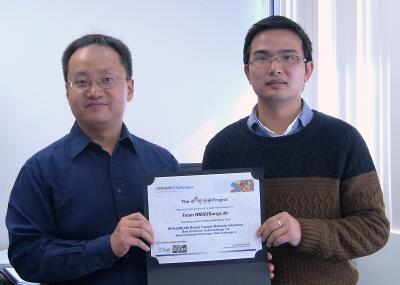NMSU professor shows there's more to computer science than gaming careers

As a computer science professor at New Mexico State University's College of Arts and Sciences, Joe Song is focused on computational biology research, creating innovative computational technology to advance quantitative understanding of life science problems.
"I see the opportunity for quantitative science to be applied to life sciences," he said. "Traditionally, life science problems have been answered by qualitative tools. We have the opportunity to work with multiple biological systems. My research interest is concerned with the interface of computer science, statistics and applied mathematics."
Most recently, Song and his doctoral student Yang Zhang participated in the Heritage Provider Network - Dialogue of Reverse Engineering Assessment of Methods Breast Cancer Network Inference, a challenge that encourages researchers to develop software systems to help understand how abnormal cell proliferation leads to breast cancer. In November Song and Zhang presented their research at the DREAM conference in Toronto.
Using real and computer-generated data, the pair created a software system to study biological systems. Their work earned them first place in the challenge, along with a $7,500 cash prize from HPN. Although this year's competition focused on breast cancer, the system can be applied to multiple gene networks in many organisms.
"Overall, our goal was to understand, at a molecular level, gene interaction; how cells divide and how they can cause tumor tissues to grow uncontrollably," Song said. "We want to know what genetic factors lead to this cell proliferation."
Song's interest in computational biology began when he was a graduate student at the University of Washington at Seattle. As an undergraduate, he'd studied telecommunications and image processing at the Beijing University of Posts and Telecommunications.
"Somehow, the life science problems caught my eye; that's how I first got into computational biology," he said. "I'm always interested in developing new methodology to detect useful information from data. That's the main theme of my work and that hasn't changed, even though I work with different applications. The most rewarding aspect is when I see application of my work in my collaborators' research projects that come up with potential explanations for how biological systems work.
"I really enjoyed the experiences of having been educated in both China and the United States," he added. "I would not be where I am today if I'd only received one. With the Chinese training, I think I'm obtained very strong training in mathematical skills. In the U.S., I feel lucky to have met an adviser, who taught me to be intellectually creative in coming up with answers."
Part of the challenge Song encounters in his research includes coming up with creative and innovative approaches to the problems he tries to solve. He attributed Zhang's and his success at the DREAM8 challenge to creativity.
Like his mentor, Zhang is an alumnus of the Beijing University of Posts and Telecommunications, where he studied industrial design as an undergraduate. He said he was drawn to biological applications of computer science because of the many opportunities for breakthroughs in the field.
"This system we developed can apply to a lot of different network scenarios," Zhang said. "We're not trained as biologists, but right now, we're trying to figure out how genes interact with each other. There are many life science problems (such as treating HIV and breast cancer) that don't have a satisfactory solution yet. With the power of computers, we are trying to approach those genetic markers that may reveal where a goldmine may be located."
Song said he encourages students to consider careers in computational biology, a field that offers many opportunities for interdisciplinary collaborations.
"Computational biology may not seem obvious, because its presence is not yet in a typical daily life's experience," he explained." Some students come to computer science with an interest in game design, because they have experienced playing games. Many do not realize the opportunities in computational biology. I personally believe there is huge potential for personal genomic information to be used in very creative ways. I predict that it is going to be significantly involved in our daily lives in the future."
Zhang said he hopes to continue doing research even after he graduates.
In addition to their DREAM8 winnings, Song and Zhang have received funding for their research from the National Science Foundation and the National Cancer Institute.


